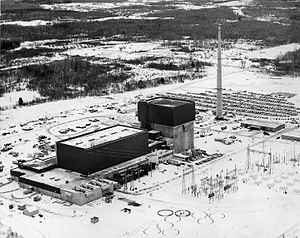James A. FitzPatrick Nuclear Power Plant
| James A. FitzPatrick Nuclear Power Plant | |
|---|---|
 James A. FitzPatrick Nuclear Power Plant | |
 | |
| Country | United States |
| Location | Scriba, Oswego County, near Oswego, New York |
| Coordinates | 43°31.4′N 76°23.9′W / 43.5233°N 76.3983°W |
| Status | Operational |
| Construction began | September 1, 1968 |
| Commission date | July 28, 1975 |
| Construction cost | $1.065 billion (2007 USD)[1] |
| Owner | Constellation Energy |
| Operator | Constellation Energy |
| Nuclear power station | |
| Reactor type | BWR |
| Reactor supplier | General Electric |
| Cooling source | Lake Ontario |
| Thermal capacity | 1 × 2536 MWth |
| Power generation | |
| Units operational | 1 × 813 MW |
| Make and model | BWR-4 (Mark 1) |
| Nameplate capacity | 813 MW |
| Capacity factor | 86.82% (2017) 77.3% (lifetime) |
| Annual net output | 6183 GWh (2017) |
| External links | |
| Website | James A. FitzPatrick Nuclear Power Plant |
| Commons | Related media on Commons |
The James A. FitzPatrick (JAF) Nuclear Power Plant is located in the Town of Scriba, near Oswego, New York, on the southeast shore of Lake Ontario. The nuclear power plant has one General Electric boiling water reactor. The 900-acre (360 ha) site is also the location of two other units at the Nine Mile Point Nuclear Generating Station.
The power plant was originally built by Niagara Mohawk Power Corporation. FitzPatrick and half of the Nine Mile Point site were transferred to the Power Authority of the State of New York (PASNY), now called the New York Power Authority (NYPA). It was named after Power Authority Chairman James A. FitzPatrick, and the NYPA operated the plant until November 2000 when it was sold to Entergy Corporation.[2] On November 2, 2015, Entergy announced its plans to shut down FitzPatrick at the time of its next fuel change in 2016[3] but instead elected to sell the plant to Exelon Generation for $110 million.[4]
On April 1, 2017, Exelon's generation division, Constellation Energy assumed ownership and continues to operate the plant.
Surrounding population
[edit]The Nuclear Regulatory Commission defines two emergency planning zones around nuclear power plants: a plume exposure pathway zone with a radius of 10 miles (16 km), concerned primarily with exposure to, and inhalation of, airborne radioactive contamination, and an ingestion pathway zone of about 50 miles (80 km), concerned primarily with ingestion of food and liquid contaminated by radioactivity.[5]
The 2010 U.S. population within 10 miles (16 km) of FitzPatrick was 35,136, an increase of 17.0 percent in a decade, according to an analysis of U.S. Census data for msnbc.com. The 2010 U.S. population within 50 miles (80 km) was 909,798, an increase of 3.2 percent since 2000. Cities within 50 miles include Syracuse (36 miles to city center). Canadian population is not included in these figures, such as Kingston, Ontario, 49 miles to the city center.[6]
Seismic risk
[edit]The Nuclear Regulatory Commission's estimate of the risk each year of an earthquake intense enough to cause core damage to the reactor at FitzPatrick was 1 in 163,934, according to an NRC study published in August 2010.[7][8]
Announced closure
[edit]On November 2, 2015, Entergy Corporation announced that it intended to close the James A. FitzPatrick Nuclear Power Plant because it is becoming too costly to operate.[3][9] The nuclear industry's profits had been squeezed out by cheaper energy from natural gas plants. “Given the financial challenges our merchant power plants face from sustained wholesale power price declines and other unfavorable market conditions, we have been assessing each asset,” Chief Executive Officer Leo Denault said in the statement. “Market conditions require us to also close the FitzPatrick nuclear plant.”[10]
In 2016, Cuomo directed the Public Service Commission to consider ratepayer-financed subsidies similar to those for renewable sources to keep carbon free nuclear power stations profitable in the competition against carbon based natural gas.[11][12]
In August 2016, Exelon agreed to buy the plant pending regulatory approval and formally acquired ownership and operation on March 31, 2017.
See also
[edit]- Darlington Nuclear Generating Station — located on the opposite side of Lake Ontario
- List of nuclear reactors
- New York energy law
- Nuclear power
- Nuclear power plant
- Pickering Nuclear Generating Station — located on the opposite side of Lake Ontario
Notes
[edit]- ^ "EIA - State Nuclear Profiles". www.eia.gov. Retrieved 3 October 2017.
- ^ "Highlights of NYPA History Since 1931". New York Power Authority. Retrieved 26 August 2024.
- ^ a b Knauss, Tim (Nov 2, 2015). "Entergy to close FitzPatrick nuclear plant in Oswego County". syracuse.com. Retrieved 2016-11-02.
- ^ House, Samantha (August 9, 2016). "Exelon agrees to buy FitzPatrick nuclear plant in Oswego County". syracuse.com. Retrieved 2016-11-02.
- ^ "Emergency Planning Zones". U.S. Nuclear Regulatory Commission. September 29, 2014. Retrieved 2016-11-02.
- ^ "Nuclear neighbors: Population rises near US reactors". NBC News. 2011-04-14. Retrieved 2024-08-16.
- ^ "What are the odds? US nuke plants ranked by quake risk". NBC News. 2011-03-16. Retrieved 2024-08-16.
- ^ "Archived copy" (PDF). Archived from the original (PDF) on 2017-05-25. Retrieved 2011-04-19.
{{cite web}}: CS1 maint: archived copy as title (link) - ^ McGeehan, Patrick (November 2, 2015). "Entergy to Close Nuclear Plant on Lake Ontario, Angering Cuomo". The New York Times.
- ^ Polson, Jim (November 2, 2015). "Entergy to Close FitzPatrick Nuclear Power Plant in New York". Bloomberg Business.
- ^ Yee, Vivian (July 20, 2016). "Nuclear Subsidies Are Key Part of New York's Clean-Energy Plan". The New York Times.
- ^ "NYSDPS-DMM: Matter Master".
Further reading
[edit]- "New York Nuclear Profile". Energy Information Administration. U.S. Department of Energy (DOE). 2010. Retrieved 2016-11-04.
- Conca, James (November 10, 2015). "If No One Wants The FitzPatrick Nuclear Power Plant To Close, Why Is It Closing?". Forbes.

